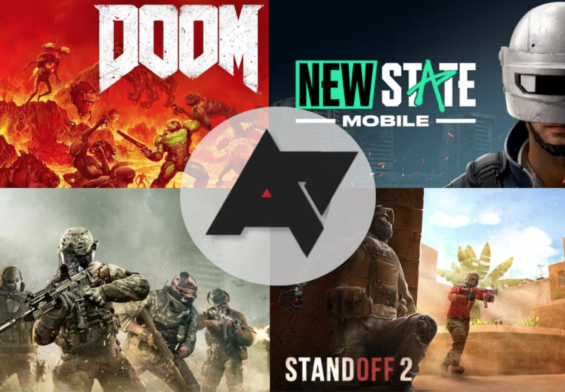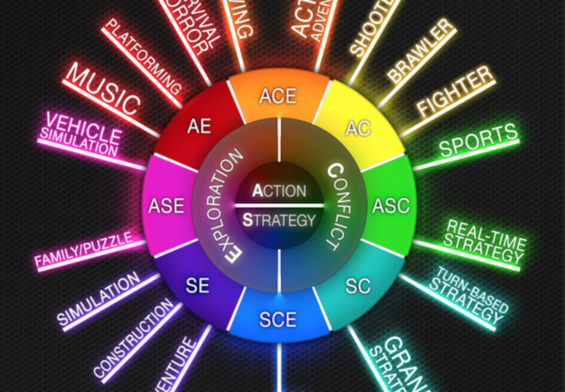By LadiesGamers
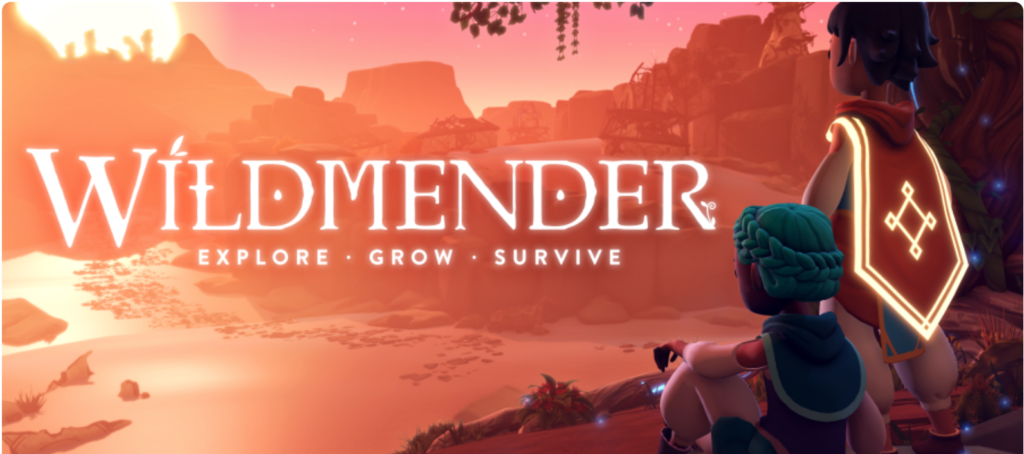
At this year’s GamesCom we had the chance to sit down with Cameron Bajus, designer of Wildmender. Published by Kwalee, Wildmender is a desert survival gardening game.
In it, you start from a tiny desert spring and cultivate your oasis amongst the desert sands. Collect plants to grow whilst exploring the world, craft structures, and harness magical essence. You’ll have to manage your food and water as you journey across the dunes, the drained sea, poisoned canyons and cold and distant mountains. The further you go, the greater your perils and rewards! You’ll need to travel far to learn the secrets of the life-draining wraiths that corrupt the land and how to beat them.
I’ve played the demo when it was available on Steam, and now it’s time to discuss it with Cameron!
Cameron and Muse Games
Thank you for doing this interview with us! Can you tell our audience a bit about yourself?
Hi, my name is Cameron, I work with Muse Games which is a development studio out of New York. I’ve been with the team for about five years. At this point. I’ve had my hand in most of our releases, all of them during that time. I’ve also had the opportunity to work on a couple of games before that in previous internships. During the years I’ve seen a couple of shifts in the company’s culture. It’s always been a fantastic place to work!
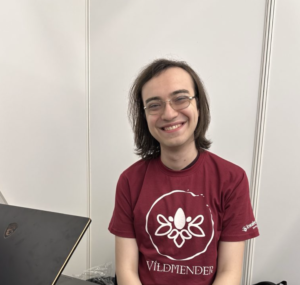
Even before I started working with Muse Games I helped them out at big shows like this one. There are some big shows in the United States that are right by where I was going to university. I knew the team just because I played their games so much and I said “Hey you guys need an extra hand at this convention?” They agreed and took me up on that offer. That was for Guns of Icarus Alliance, way back in the day. From there I’ve been helping out at coms and I eventually got hired by the company.
Can you tell us a bit more about Muse Games?
Yes, it’s really diving into my history knowledge. Muse Games has been around longer than I have been with them, they sorted in 2010. If I remember correctly it actually started out as a 3D design studio, making 3D spaces to show visual representations for businesses and whatnot. In the process of doing that, we have learned the Unity engine inside and out. The idea formed that we already had all the tools to make games which sounded super fun. So it pivoted towards that, there were a couple of test games and trials and whatnot that were received super well and we’ve been riding that wave ever since.
One of the studio’s first game was Flight of Icarus in 2010, which is a tower defence game. And looking at the various games Muse Games has made, they are all different in genre, like Creavures, multiplayer shooter Embr and beat’m up Hamsterdam. Being Dutch, I was wondering, does that refer to Amsterdam?
Absolutely, that pun is there on purpose, it takes place in Hamsterdam, and in the game you move through a couple of districts very much inspired by Amsterdam.
After the various genres of games you made, what was the reason to go for the simulation and survival genre?
Yes, we do have a lot of games in a lot of different genres but what ties them all together is the concept of teamwork and working together. Even in our single-player game Flight of the Icarus and Hamsterdam there are elements of working together and the community with NPCs. Most of our games have a strong co-op multiplayer component because we like to play games with each other and our friends.
Embr is a co-op firefighting simulator, Flight of the Icarus turned into Guns of Icarus which is a PVP game but it’s very heavily team-based, you need to work together in order to succeed in Guns of Icarus. And Wildmender too, supports up to four-player co-op so you need to work together to make your vision of the garden.
Wildmender: Turning the Desert Green
How did the idea form for Wildmender? There is a strong component in there of taking care of the environment, a wasteland trying to turn the desert green again certainly is a current topic. Was that part of making the game?
Absolutely! When we want to figure out what new game we’re making, the entire team will sit down and break up into little groups for a small game-jam in the office. Everyone comes up with something that you know they are really excited to work on, just a short little showcase or demo or something like that.
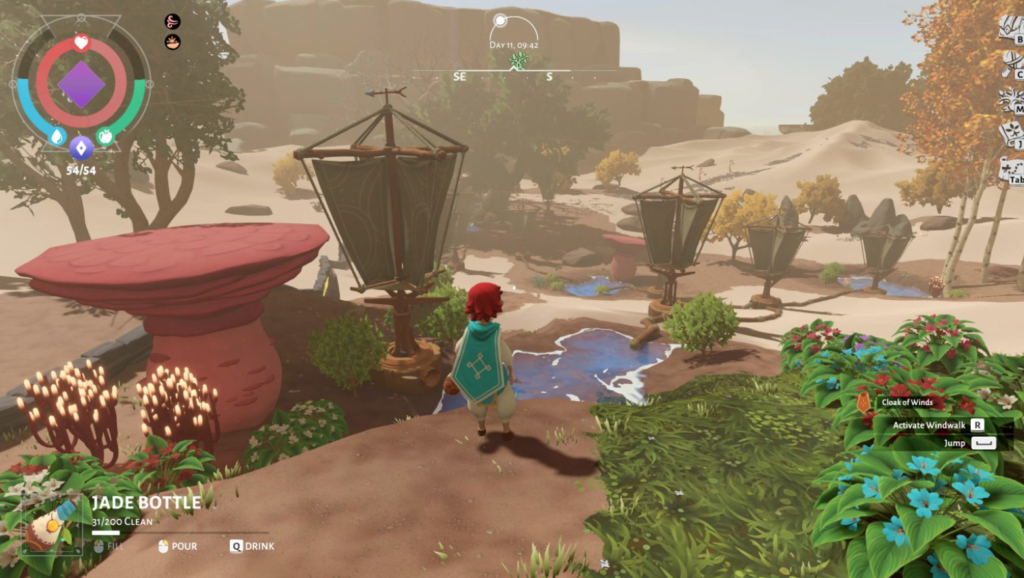
Originally with Wildmender one of our senior programmers wanted to sit down and try to make a naturalistic tree generator system. A really simple simulation that every time you ran it would make a different tree. It was generated by an algorithm and had a huge diversity in the amount of trees it made. Of course, they all very much looked like trees because they were based on the natural world.
That was so cool and our minds immediately started running, how do we make a game around trees? Where trees are really interesting and not just something you chop down for wood resources. That set the direction early on of “Okay nature becomes the focus and cultivating trees!” That algorithm worked very well for bushes and shrubs and a lot of other things that you’ll see in the game. We like to give our games a little bit of real-life meaning as well. So the thought followed very naturally: “Well, here’s a game that’s primarily about growing trees and growing a garden. We want to make a really dramatic change so players can really see the influence they are making on the world”.
What kind of audience do you think will love Wildmender?
You hear this answer all the time I’m sure, but I promise I mean it…it really is designed for everyone. There are all sorts of different things to do and lots of different things to engage with, we made sure you have a lot of freedom to engage with those things that you want to. If you want to make a huge botanical garden with paths and bridges and water features and all of that, it’s absolutely possible to do so.
But if you want to fight, there are different combat challenges for you as well. We have a combat system for fighting off the evil wraiths with very diverse difficulty settings. Not just easy, medium, hard and expert, but you can shift settings like how much health the enemies have, how much damage they do, how fast or slow plants grow, and how fast or slow your own resources naturally degenerate. So for players who want a significantly more difficult experience that’s set up for them to do. And for players who want to hang out and make a garden and really don’t want to engage with the combat at all, it’s possible to turn the combat into a completely trivial experience.
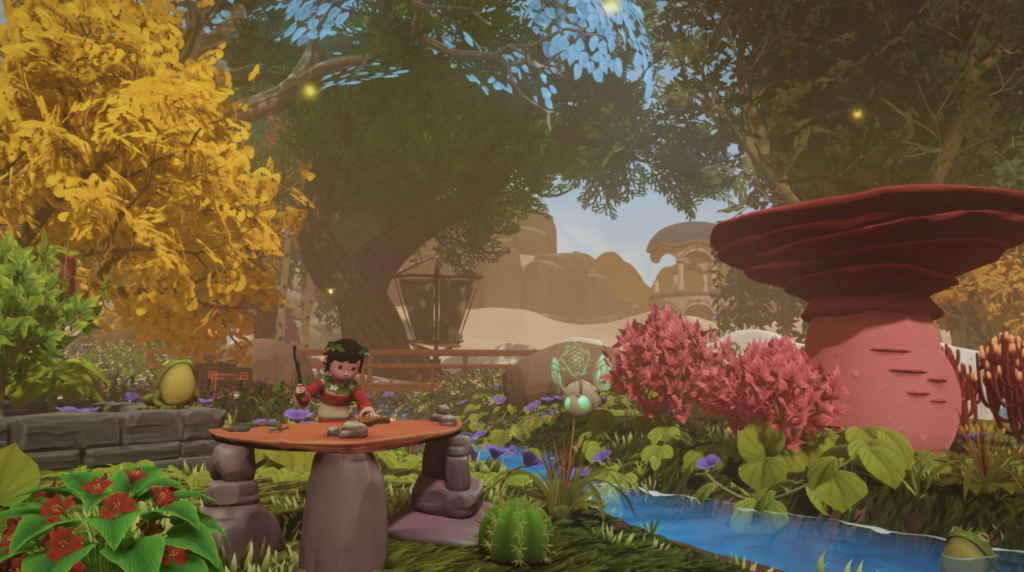
Feel the Loneliness
I noticed when playing the demo, that you can turn the camera to look around, but you never see your character in his face during the game. Only when you go to inventory and items. Why did you make this choice?
You can see the player’s face in the customisation menu or when you open up a lot of the crafting menus, the camera will turn around and you can see him working at the bench. We wanted players to imprint themselves on the character. We didn’t want to make a first-person game as we wanted our character’s designs to be seen.
Great, because I always get motion sickness
A lot of people do. On the other hand, we didn’t want to give players the feeling, like in a lot of third-person games, of fully controlling, and commanding the character. So here’s a character you can embody but it’s still very much a set character in this world of Wildmender. Imprinting it with your own idea of how the character should look was very important to us.
There’s a whole bunch of customisation options in the way that your character can be changed, hairstyles, skin colours and your fashions. We have a lot of ways you can customise outfits, really down to a lot of fine colour values. And we want you to still see your character interact with the world when you’re not in direct control of them.
There is no spoken language in Wildmender, just typed text. Even with the very calming and atmospheric music in the background, I feel it’s the lonely existence of our protagonist. Was it a conscious decision as well?
Yes, it is a very desolate experience for the player, you’re very clearly in the aftermath of something that happened to this world. There are a lot of the ghosts and echoes of this world that used to exist before you came into play. We leaned into that as we expanded the narrative and the quest experience. At one point we had ideas of a companion character that would always be with you, follow you and you’d always be able to talk to them no matter where you are. But as we came to implement that we found it took away the feeling of solitude in a way we didn’t really like, we felt like it was taking away from the experience. So now, in order to talk to people, you have to connect with NPCs that are in static locations, so this means a lot of moving around the world. You get to see and feel the emptiness of the aftermath of this major happening.
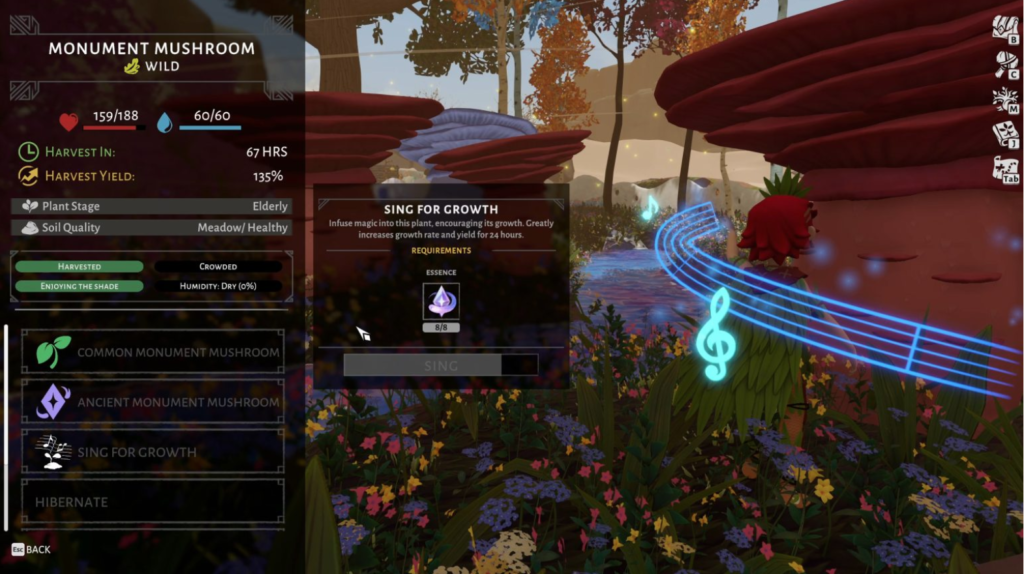
What is the biggest challenge in designing Wildmender, and how did you overcome it?
So there are a lot of different aspects of AI in this game, I mean the sort of game dev version of AI, not the newer arts definition of AI. When I say AI, I’m talking about the way that our game and our NPCs and plants interact. Our game is also completely randomly generated every time, but as a designer, I had access to some rules to make sure that things are placed in ways that make sense in a landscape that will shift and change every single time you restart the game.
So making sure that all of those rules would work together so that the game is trying to respond in that very naturalistic way. The NPCs had to behave in ways that make sense, not running through walls and doing silly things that would break you out of the game. There were a lot of edges and corner places in there it took us a lot of time to erase as many of them as we could, and make sure the game was running in such a way that the player says “Ah yes this is a real-world” as opposed to “oh okay things are running through walls and roofs are making these huge right angles all over the place”. Those are really immersion-breaking systems. We want a high level of variability and there’s no way we can program every single little art asset for that. The game makes a lot of its own decisions in those aspects and makes sure those decisions are always correct.
Full Release Ahead
The version that was up as a demo, is that the version that is going to be released on September 28th?
The full release of course has way more content that we have been working on, we have a story that involves a bunch of different Gods, with them in their different environments. You really piece together the mystery of what happened. We also have something we are really excited to reveal, which is very long post-game content that will allow you to restore very large chunks of the world at once, through a significant amount of effort and resources. And with that, it’s really going to expedite a lot of players who expressed they want to turn the entire world back to green. That can be done in the base game, but it would take a very long time kind of doing it piece by piece. So we made ways for you to interact with the Gods and made sure there is a narrative that runs through that. It’s also specifically put together in such a way that you don’t need to complete the base game before you start engaging this content.
We also made a system where the game will know what things you have and haven’t accomplished and the NPCs will respond accordingly to that.
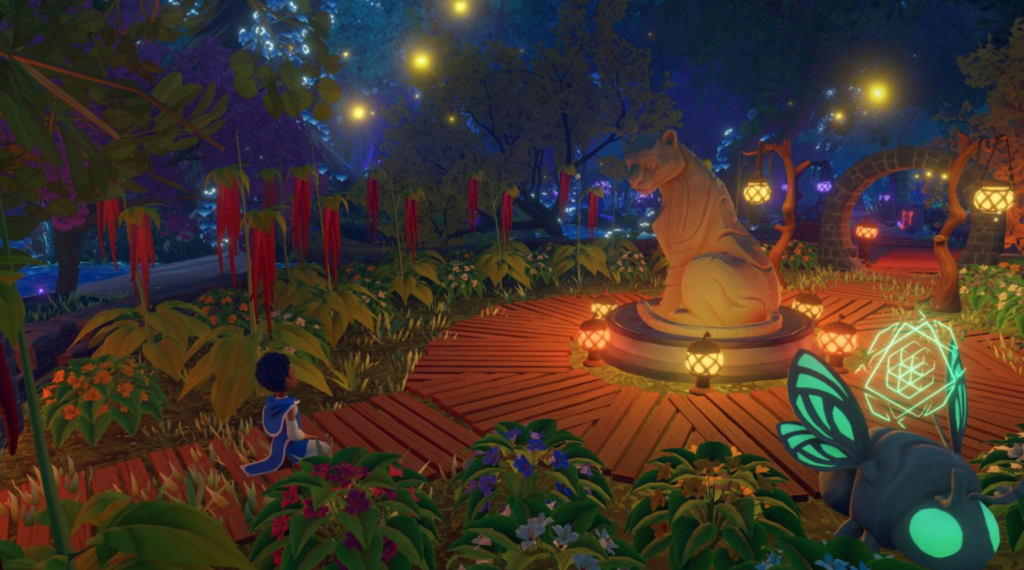
I’m a huge Nintendo Switch fan, will Wildmender be coming to Switch too?
So we really wanted to focus at first on the experience of bringing it to PC, Xbox X&S and PlayStation 5, they run on a lot smaller hardware and are the fastest to develop for. We wanted to get the game into the hands of people as soon as possible. After we wrap this up and really get that function of the game to be something that we are happy with, then we might look into going to the Switch from there. But it’s not on our September 28th release date.
I must say it works well on the Steam Deck already!
We’re investigating better Steam deck integration, once again I’m on the design team and that is part of the technical aspects of things, and I sort of peek my nose into the discord channels that I’m not supposed to be in every so often to keep up with updates in that area.
Advice About Game Development
What advice would you offer aspiring developers working alone or in a tiny team?
That’s a fantastic question! One of the things that’s really important for us is we do play tests all the time. Every single week we run a play test of all the new things we have put in the game and we want people to look at, get their eyes and hands on it.
The tech team really appreciates that because they get to make sure their stuff is tested and working on a larger scale before they really start expanding and diving into those technical aspects.
The art team really appreciate it as it’s a huge morale boost to them to see their art integrated very regularly. Instead of looking at a green rectangle that’s supposed to represent a character, now we have the art or animation in for that, the art team gets to hear everyone oh’s and ah’s
Being a designer affects me really well and gets me on top of all those bits. As a designer mantra, I’m always telling myself that it is Fail Faster. It’s a lesson I have to learn every single week, can’t get it into my thick skull yet! I get very attached to my designs, they are like my children and want them to do well. But sometimes they fail from the beginning as I’ve made the wrong assumption. They go into the game and I get that feedback that it’s not working in this aspect and my initial reaction, even to this day, is “Well you didn’t do it right, you did it wrong so of course you thought it was bad”.
Although I do know that is good feedback, something about the design leads people to do it wrong.
So sometimes it’s back to the drawing board or we have to completely throw away that aspect and start with something new. I don’t think of failure as a bad word, as soon as I see something as a failure and it doesn’t add to the betterment of the game, I toss it away and use the next thing that has a better chance of working,
It’s important people are giving their feedback for a reason and you need to listen to that and swallow your own pride.
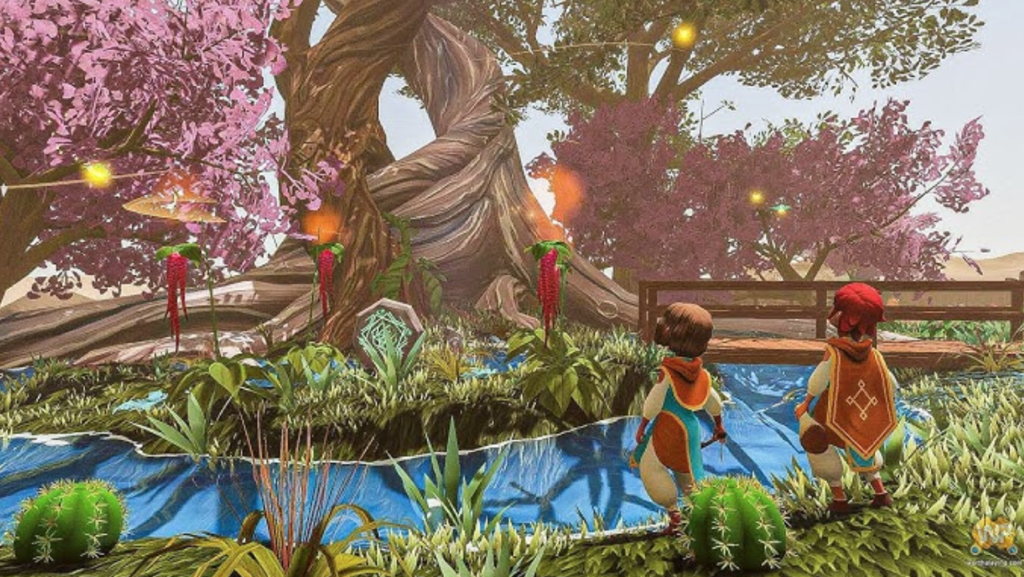
So sometimes it’s back to the drawing board or we have to completely throw away that aspect and start with something new. I don’t think of failure as a bad word, as soon as I see something as a failure and it doesn’t add to the betterment of the game, I toss it away and use the next thing that has a better chance of working.
It’s important people are giving their feedback for a reason and you need to listen to that and swallow your own pride.



